IASbaba's Daily Current Affairs Analysis
Archives
(PRELIMS + MAINS FOCUS)
SolarWinds Hack: A cyberattack discovered in the USA
Part of: GS Prelims and GS-III – Cybersecurity
In news
- The ‘SolarWinds hack’, a cyberattack recently discovered in the USA.
- It has emerged as one of the biggest ever targeted against the US government, its agencies and several other private companies.
- It is likely a global cyberattack.
Key takeaways
- This is being called a ‘Supply Chain’ attack.
- Instead of directly attacking the federal government or a private organisation’s network, the hackers target a third-party vendor, which supplies software to them.
- In this case, the target was an IT management software called Orion, supplied by the Texas-based company SolarWinds.
- Orion has been a dominant software from SolarWinds with clients, which include over 33,000 companies.
- The hackers gained “access to victims via trojanized updates to SolarWinds’ Orion IT monitoring and management software.
- Once installed, the malware gave a backdoor entry to the hackers to the systems and networks of SolarWinds’ customers.
India pledges a sum of USD 1 million to the World Anti-Doping Agency (WADA)
Part of: GS Prelims and GS-II – International Relations
In news
- India has pledged a sum of USD 1 million to the World Anti-Doping Agency (WADA) towards the agency’s scientific research budget.
- It will allow WADA to develop innovative anti-doping testing and detection methods.
Important value additions
The World Anti-Doping Agency
- It is a foundation initiated by the International Olympic Committee to promote, coordinate and monitor the fight against drugs in sports.
- The agency’s key activities include monitoring of the World Anti-Doping Code, whose provisions are enforced by the UNESCO International Convention against Doping in Sport.
- Headquarters: Montreal, Quebec, Canada.
- Established in: 1999.
GPS-Based Toll Collection System
Part of: GS Prelims and GS-III – Infrastructure
In news
- The Government has finalised GPS-based (Global Positioning System) toll collection to ensure seamless movement of vehicles across the country.
- Ministry: Union Minister of Road Transport & Highways
Key takeaways
- This will ensure India becomes ‘toll booth free’ in next two years.
- The toll amount will be deducted directly from the bank account based on the movement of vehicles.
- While now all commercial vehicles are coming with vehicle tracking systems, the Government will come up with some plan to install GPS technology in old vehicles.
- The Minister expressed hope that the toll collections may reach Rs 34 thousand crore by March 2021.
- By using GPS technology for toll collection, the toll income in next five years will be Rs 1.34 lakh crore.
Related article:
- About FASTag: Click here
Winter session Of Parliament cancelled this year due to Covid-19
Part of: GS Prelims and GS-II – Parliament; Constitution
In news
- Due to Covid-19, the Winter session of the Parliament has been cancelled this year.
- Budget Session shall be held in January, 2021.
Key takeaways
- The power to convene a session of Parliament rests with the government.
- The decision is taken by the Cabinet Committee on Parliamentary Affairs, which currently comprises nine ministers, including Defence, Home, Finance, and Law Ministers.
- The decision of the Committee is formalised by the President, in whose name MPs are summoned to meet for a session.
- The summoning of Parliament is specified in Article 85 of the Constitution.
- This provision specified that the central legislature had to be summoned to meet at least once a year, and that not more than 12 months could elapse between two sessions.
- India does not have a fixed parliamentary calendar.
- By convention, Parliament meets for three sessions in a year.
The Defence Acquisition Council (DAC) approves proposals to procure equipment
Part of: GS Prelims and GS-III – Defence & Security
In news
- The Defence Acquisition Council (DAC) in its meeting approved proposals to procure equipment worth Rs 28,000 crore.
- Ministry: Ministry of Defence
Key takeaways
- Acquisition proposals approved include the DRDO designed and developed Airborne Early Warning & Control (AEW&C) Systems for the Indian Air Force, Next Generation Offshore Patrol Vessels for the Indian Navy and Modular Bridges for the Indian Army.
- This is the first meeting of the DAC under the new regime of Defence Acquisition Procedure 2020.
- These are the first set of Acceptance of Necessity (AoNs) accorded.
- Majority of AoNs are being accorded in the highest categorization of Buy Indian (IDDM).
- 6 of the 7 proposals for which AoNs were granted will be sourced from the Indian industry to give a boost to the “Make in India” and “Atmanirbhar Bharat” initiatives of the Government.
Related articles:
- Defence Acquisition Council: Click here
- Critically analyse Defence Procurement Policy: Click here
Election Commission proposes to extend the facility of postal ballots to overseas and NRIs
Part of: GS Prelims and GS-II – Constitution
In news
- The Election Commission of India (ECI) wrote to the Law Ministry, proposing to extend the facility of postal ballots to (eligible) overseas, non-resident Indians (NRIs) for the Assembly elections in Assam, Kerala, Puducherry, Tamil Nadu and West Bengal in 2021.
Key takeaways
- The ECI proposed amending the Conduct of Election Rules, 1961, in order to allow this facility.
- The postal ballots will be sent to NRIs electronically and they will send these ballots after choosing their candidate via post.
- This partially electronic facility is now available for service voters (being a member of the armed Forces of the Union; or a member of a force to which provisions of the Army Act, 1950) through the Electronically Transmitted Postal Ballot System, or ETPBS.
Do you know?
How can overseas voters currently vote in Indian elections?
- Prior to 2010, an Indian citizen who is an eligible voter and was residing abroad for more than six months owing to employment, education or otherwise, would not have been able to vote in elections.
- After the passing of the Representation of the People (Amendment) Act, 2010, eligible NRIs who had stayed abroad beyond six months have been enabled to vote, but only in person at the polling station where they have been enrolled as an overseas elector.
Related article:
- Election Commission: Mind map
Order issued for Matru Sahyogini Samiti in MP
Part of: GS Prelims and GS-II – Policies and Interventions
In news
- The Madhya Pradesh government has issued an order for the appointment of committees led by mothers to ensure better monitoring of services delivered at anganwadi or day care centres across the State.
Key takeaways
- It will be called ‘Matru Sahyogini Samiti’ or Mothers’ Cooperation Committees,
- These will comprise 10 mothers at each anganwadi representing the concerns of different sets of beneficiaries under the Integrated Child Development Services, or National Nutrition Mission.
- The committees will include mothers of beneficiary children as well as be represented by pregnant women and lactating mothers who are enrolled under the scheme.
- The Committees will also include a woman panch, women active in the community and eager to volunteer their support to the scheme, teachers from the local school, and women heads of self-help groups (SHG).
- These mothers will keep a watch on weekly ration distribution to beneficiaries as well as suggest nutritious and tasteful recipes for meals served to children at the centres.
- The move is being taken as per the mandate of the National Food Security Act, 2013 (NFSA).
Fordow Fuel Enrichment Plant (FFEP)
Part of: GS Prelims and GS-II – International Relations
In news
- According to satellite images, Iran has begun construction on a site at its underground nuclear facility at Fordow amid tensions with the U.S. over its atomic programme.
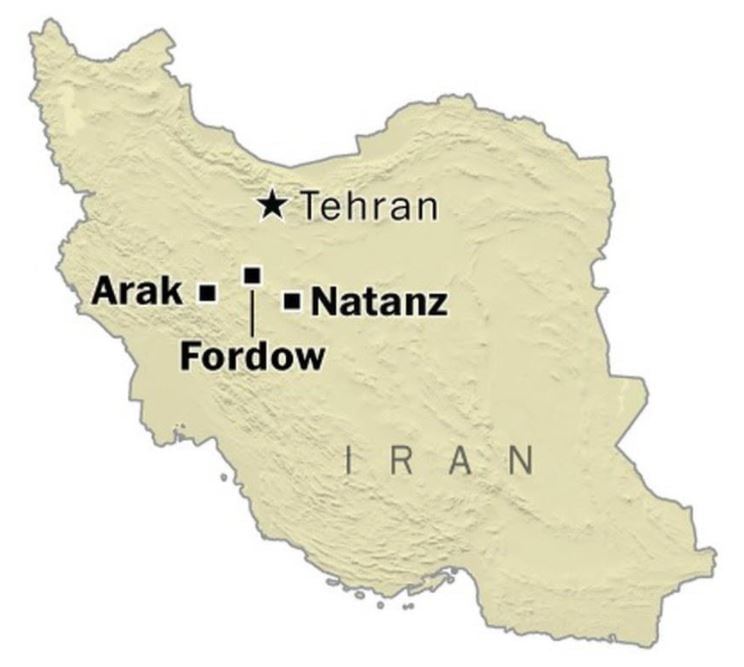
Key takeaways
- Fordow Fuel Enrichment Plant (FFEP) is an Iranian underground uranium enrichment facility located 20 miles northeast of the Iranian city of Qom, near Fordow village.
- It is the second Iranian uranium enrichment facility, the other one being that of Natanz.
- Iran has not publicly acknowledged any new construction at Fordow.
Areas suitable for grassland restoration and conservation identified in Tropical Montane Grasslands (TMG)
Part of: GS Prelims and GS-III – Environment
In news
- Tropical montane grasslands (TMG) in the Shola Sky Islands of the Western Ghats have suffered big reductions due to invasions by exotic trees.
- However, researchers have now identified areas suitable for grassland restoration and conservation to reverse the decline.
Key takeaways
- TMG are high elevation grasslands forming only 2% of all grasslands in the world.
- Function: Regulating the global carbon cycle and serving as a source of water to downstream communities.
- In India, TMG have been classified as wastelands in forest management plans since they are unlikely to generate revenue, contrary to the timber found in forests.
Do you know?
- In the Western Ghats, 23% of montane grasslands were reportedly converted into invasive exotic tree cover over a period of 44 years.
B.1.1.7 Lineage: New variant of SARS-CoV-2
Part of: GS Prelims and GS-II – Health
In news
- Recently, India suspended all flights from and to the UK until December 31, amid concerns about a new variant of SARS-CoV-2 that is spreading & growing rapidly there.
Key takeaways
- Last week, the new SARS-CoV-2 variant was revealed to be the reason behind the rapid surge in Covid-19 cases in South and East England.
- It is being referred to as VUI (Variant Under Investigation) 202012/01, or the B.1.1.7 lineage.
- The variant is the result of multiple mutations in the spike protein of the novel coronavirus SARS-CoV-2, as well as mutations in other genomic regions of the RNA virus.
- Preliminary analysis suggests that it is more transmissible than previously circulating variants.
- However, it is not deadlier.
India-Vietnam Leaders’ Virtual Summit
Part of: GS Prelims and GS-II – International Relations
In news
- Indian Prime Minister held a Virtual Summit with H.E. Nguyen Xuan Phuc, Prime Minister of Vietnam.
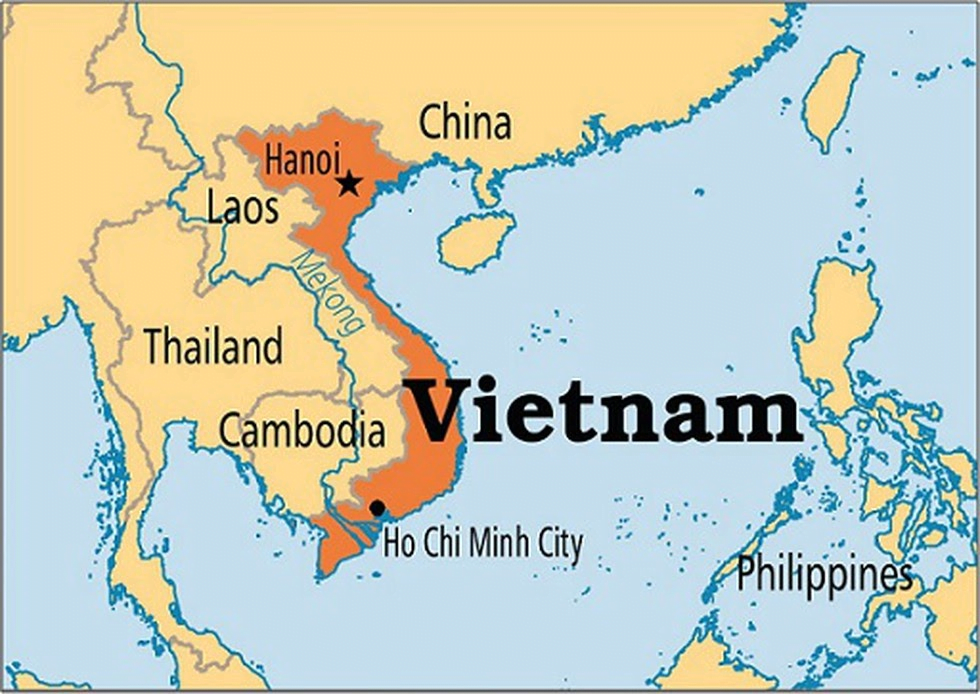
Key takeaways
- A ‘Joint Vision for Peace, Prosperity and People’ document was adopted during the Summit, to guide the future development of the India-Vietnam Comprehensive Strategic Partnership.
- Both leaders also welcomed the signing of a Plan of Action for period 2021-2023 for further implementation of Comprehensive Strategic Partnership to implement the Joint Vision.
Announcements made:
- Implementation of the High Speed Guard Boat (HSGB) Manufacturing Project for Vietnam Border Guard Command under the US$ 100 million Defence Line of Credit extended by Government of India to Vietnam;
- Completion and handing over of seven Development Projects with Indian ‘Grant-in-Aid’ Assistance of US$ 1.5 million for the benefit of local community in Vietnam’s Ninh Thuan province.
- Enhancing the number of annual Quick Impact Projects (QIPs) from currently five to ten commencing FY 2021-2022.
- Three new Development Partnership projects in heritage conservation in Vietnam (F-block of Temple at My Son; Dong Duong Buddhist Monastery in Quang Nam province; and Nhan Cham Tower in Phu Yen province).
- Launch of bilateral project for preparing an Encyclopaedia on India – Vietnam Civilizational and Cultural Relations.
Miscellaneous
Winter Solstice
-
December 21 was Winter Solstice, the shortest day of the year in the Northern Hemisphere.
- In the Southern Hemisphere, conversely, December 21 was Summer Solstice, the year’s longest day.
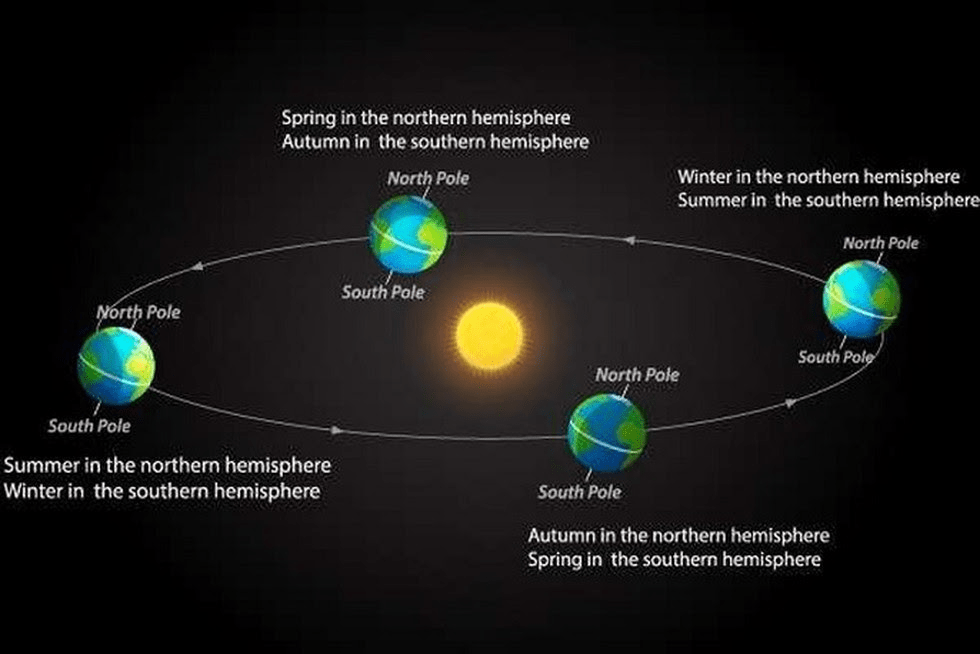
- The Earth’s axis of rotation is tilted at an angle of 23.5 degrees away from the perpendicular.
- This tilt, Earth’s spin and orbit leads to variations in the duration of Sunlight that any location on the planet receives on different days of the year.
- The winter solstice or hiemal solstice or hibernal solstice occurs when one of the Earth’s poles has its maximum tilt away from the Sun.
- It happens twice yearly, once in each hemisphere (Northern and Southern).
- Its opposite is the summer solstice.
Gurudwara Rakab Ganj Sahib
- Indian Prime Minister visited historic Gurudwara Rakab Ganj Sahib in New Delhi where the pious Sri Guru Teg Bahadur Ji’s mortal remains were cremated.
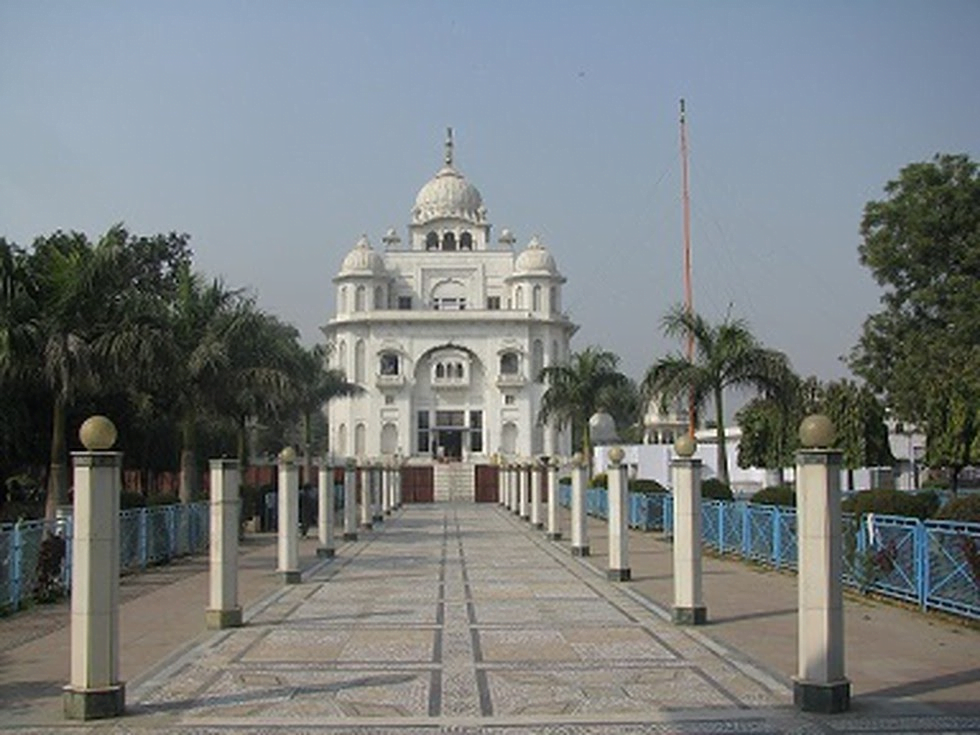
- It is a historic gurudwara near Parliament House, New Delhi.
- It was built in 1783, after Sikh military leader Baghel Singh Dhaliwal (1730–1802) captured Delhi, on 11 March 1783.
- This one marks the site of cremation of the ninth Sikh Guru, Guru Tegh Bahadur.
‘Legion Of Merit’ Award
- US President presented the prestigious Legion of Merit award to Indian Prime Minister.
- Mr. Narendra Modi was presented with the highest degree Chief Commander of the Legion of Merit which is given only to the Head of State or Government.
- The US President also presented the Legion of Merit to Australian Prime Minister Scott Morrison and the former Japanese Prime Minister Shinzo Abe.
(Mains Focus)
SOCIETY/ HEALTH/ GOVERNANCE
Topic: General Studies 1,2:
- Social Empowerment
- Issues relating to development and management of Social Sector/Services relating to Health and Human Resources.
- Government policies and interventions for development in various sectors and issues arising out of their design and implementation.
Reading NFHS data
Context: The Ministry of Health and Family Welfare (MoHFW) recently released the results from the first phase of the National Family Health Survey (NHFS).
What is National Health Family Survey (NHFS)?
- NFHS is a large-scale nationwide survey of representative households. The data is collected over multiple rounds.
- Implementation Agencies: The MoHFW has designated International Institute for Population Sciences in Mumbai as the nodal agency and the survey is a collaborative effort of IIPS; ORC Macro, Maryland (US); and the East-West Center, Hawaii (US).
- Funding: The survey is funded by the United States Agency for International Development (USAID) with supplementary support from UNICEF.
- Previous Surveys: The first four NHFS were conducted in 1992-93, 1998-99, 2005-06 and 2015-16, respectively.
What data does it collect?
- The initial factsheet for NFHS-5 provides state-wise data on 131 parameters.
- These parameters include questions such as how many households get drinking water, electricity and improved sanitation; what is sex ratio at birth, what are infant and child mortality metrics, what is the status of maternal and child health, how many have high blood sugar or high blood pressure etc.
- Each round of NFHS has also expanded the scope of inquiry.
- In the fifth iteration, for instance, there are new questions on preschool education, disability, access to a toilet facility, death registration, bathing practices during menstruation, and methods and reasons for abortion.
Why are NFHS results important?
- Evidence Based Policy making: The NFHS database is possibly the most important one because it not only feeds into the research needs and informs advocacy but also is central to both central and state-level policymaking.
- International Comparison: NFHS survey results also provide internationally comparable results. That’s because the questions and the methodology is internationally valid. Thus, it places the results of say child malnutrition trends in Bihar in the global context.
About NHFS-5
- The first phase of NHFS — for which data was collected in the second half of 2019 — covered 17 states and five Union Territories.
- The second phase of the survey was disrupted by the Covid-19 pandemic; its results are expected to come out in May 2021. The second phase will cover some of the biggest states such as Uttar Pradesh, Madhya Pradesh, Punjab and Jharkhand.
- The most important takeaway of study of first phase is that between 2015 and 2019, several Indian states have suffered a reversal on several child malnutrition parameters
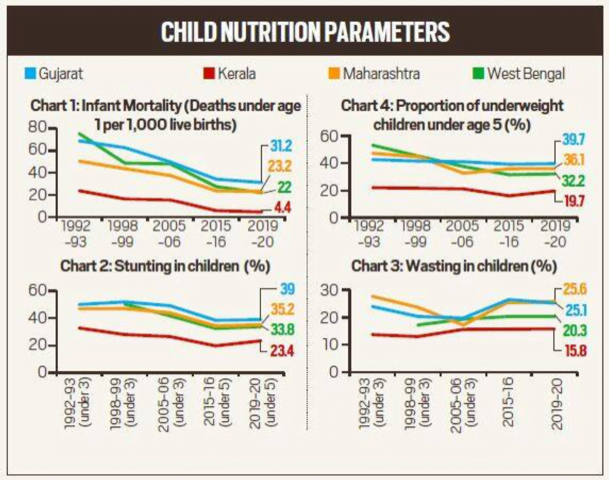
What has NFHS-5 found?
- Worsening Child Malnutrition: The most troubling finding is that on child malnutrition parameters — such as infant and child (under 5 years of age) mortality, child stunting (low height for one’s age), child wasting ( low weight for one’s height) and proportion of underweight children — several states have either been stagnant or worsened (refer above figure)
- In other words, children born between 2014 and 2019 (that is, 0 to 5 years of age) are more malnourished than the previous generation.
- Indicates Chronic Malnutrition: The reversal in the proportion of children who are stunted is the most worrisome because unlike wasting and being underweight (which can be due to short term reasons and represent acute malnutrition), stunting represents chronic malnutrition. Reversals in stunting are unheard of in growing economies with stable democracies.
- Second Phase may throw worse results due to impact ofPandemic: Another cause of concern is the fact that the first phase data is pre-pandemic and it is quite likely that the second phase — which will also incorporate Covid’s impact — may throw up ever poorer results.
What is the significance of these results?
- Malnutrition leads to poor human resources: Worsening child malnutrition, as well as rising levels of anaemia in women (especially pregnant ones), points to Indian children born in the past 5 years likely suffering from both cognitive and physical deficiencies.
- Initiatives on Sanitation not yielded results: Between NFHS-3 (2005-06) and NFHS-4 (2015-16), India registered its most significant reduction in child malnutrition, thanks to a flurry of interventions such nutrition missions, ICDS, MGNREGA and expansion of PDS among others. The latest results show that health-wise, India has taken a turn for the worse since 2015 despite improvements in water availability and sanitation methods.
- Needs further analysis: Experts say that only when the full set of raw unit-level data is available can a proper analysis of why India suffered such reversals over the past five years be done.
Conclusion
Health outcomes such as child malnutrition data are the result of a complex set of reasons — ranging from the state of a family’s income generation to environmental factors to government interventions.
POLITY/ GOVERNANCE
Topic: General Studies 2:
- Parliament—structure, functioning, conduct of business, powers & privileges and issues arising out of these.
Increasing Parliament’s efficacy and effectiveness
Context: The only way to ensure orderly business will be to transact most of the business in committees.
Committee System
If the committee system has to be made effective and credible, several steps need to be taken to make their working non-partisan, some of the steps are as follow:
- More Transparency: Opening the deliberations of the committees to the public, to electronic, print, and digital media
- Civic Participation: Giving the committees assistance of NGOs and non-profit organisations in the respective fields.
- Channel for wider dissemination: Starting a Public Broadcasting Service channel as in the UK and USA for wider dissemination of the deliberations of the committees.
- Rights & Privileges: If Parliament is to transact its business through the committees, they must have all the rights and privileges of the whole House.
- Greater Participation by Ministers: The Council of Ministers — as well as the Prime Minister — must be encouraged to appear before the committees.
- Joint Parliamentary Committee: It is also imperative to reassert the role of the joint parliamentary committee and to restore its credibility.
Best practices of parliamentary democracy in other countries
- Legislation must be enacted on matters pertaining to the functioning of Parliament — to lay down an annual calendar for Parliament sessions, minimum duration of sessions in a year etc, as in several countries.
- A law should be enacted to regulate administration of Parliament as in the UK, Australia and New Zealand.
- Steps also need to be taken to create a parliamentary budget office as in the US, UK and Canada for independent scrutiny of the budget proposals and their placement before the committees of Parliament.
- The oversight of Parliament must be increased to approving international treaties and reviewing the work of intelligence and investigating agencies.
Connecting the dots:
- What are the issues with respect to Indian Parliament?
- The PMO Office has become too strong which is sidelining the Parliament?
(TEST YOUR KNOWLEDGE)
Model questions: (You can now post your answers in comment section)
Note:
- Correct answers of today’s questions will be provided in next day’s DNA section. Kindly refer to it and update your answers.
- Comments Up-voted by IASbaba are also the “correct answers”.
Q.1 Gurudwara Rakab Ganj Sahib is the site of cremation for which of the following Sikh Guru?
- Guru Amar Das
- Guru Angad Dev
- Guru Tegh Bahadur
- Guru Gobind Singh
Q.2 Consider the following statements regarding Winter Solstice:
- It occurs when one of the Earth’s poles has its minimum tilt away from the Sun.
- It is the shortest day of the year in both the Hemispheres.
Which of the above is/are correct?
- 1 only
- 2 only
- Both 1 and 2
- Neither 1 nor 2
Q.3 Shola Sky Islands are a part of which of the following?
- Western Ghats
- Eastern Ghats
- Himalayas
- Andaman and Nicobar Islands
Q.4 ‘Matru Sahyogini Samiti’ shall be appointed in which of the following state of India?
- Madhya Pradesh
- Uttar Pradesh
- Rajasthan
- Gujarat
ANSWERS FOR 21st December 2020 TEST YOUR KNOWLEDGE (TYK)
| 1 | A |
| 2 | A |
| 3 | C |
| 4 | B |
Must Read
About turmoil in Nepal:
About temporary travel ban from UK:
About impact of anti-conversion law (Love Jihad Law) on women:











